
“It’s About More than Just the Law”
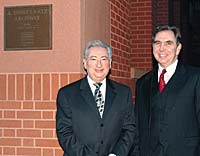 |
|
A. Sidney Katz and Dean Michael K. Young at the A. Sidney Katz Archway that connects the University Yard to 20th Street.
Photo by: Claire Duggan
|
Anyone who knows about intellectual property law knows that GW Law School is the alma mater of many of the best and most respected IP lawyers in the United States. Certainly, A. Sidney Katz, JD ’66, knew about GW’s reputation when he entered law school in the early 1960s.
Katz attended the Law School as an evening student while working full time as a patent examiner at the U.S. Patent Office. His goal was to practice patent law, and GW Law School was the obvious choice. Prior to law school, he had received his BS in electrical engineering from the Illinois Institute of Technology while working part time as an engineering technician and math tutor, after having served in the U.S. Army.
Known to friends and colleagues as “Sid,” Katz understood from the start that excellence in patent law is more than a simple equation of technical plus legal knowledge. As a law student, he took full advantage of the academics as well as the IP community at GW. He was a founding officer of the Student Patent Law Association and the Patent Moot Court. Katz’s participation in extracurricular activities resulted in a rich law school experience that provided a model that Katz carried with him into practice: Know the technology and the law but understand the context, the players, and the objectives.
After law school, Katz returned to Chicago and joined a prominent law firm where he later became a partner. His practice included counseling on and litigating a broad range of patent, trademark, and copyright matters. He also made time to participate in professional and community activities, such as his long-standing membership in the Institute of Electrical and Electronic Engineers.
After only 15 years in practice, Katz was awarded the 1982 Patent Resources Group Award of Distinction for Outstanding Contribution to the Field of IP Law because of his work in the protection of video games. His involvement in the early “Pac Man” cases had required him to understand the IP laws and apply them both to new technology and his client’s business objectives.
In 1983, Katz co-founded Welsh & Katz Ltd., an IP specialty firm located in Chicago. When Katz established the firm, he was particularly committed to building a firm that could integrate technology, law, and business and could include experienced general trial attorneys to bridge the gaps between the technologists, courts, and juries. In addition, he understood the need for strong transactional capabilities to handle technology licenses and transfers when required by a client’s business strategies and economics. Started with six attorneys, Welsh & Katz has grown to more than 50 lawyers. It has maintained a strong competitive position representing Fortune 500 clients as well as smaller companies and universities.
As exemplified by Katz, the firm also encourages its lawyers to participate in professional, business, and community activities. Among his own activities, Katz served as treasurer and president of the Association of Patent Law Firms, a national organization of law firms that devote a majority of their practice to patent law.
Throughout his career, Katz has continued his commitment to GW Law School. He was appointed an inaugural member of the IP Advisory Board in 2000. According to Dean Michael K. Young, “Our Law School has produced many members of the bar and the bench who are at the forefront of the intellectual property law field. Sid Katz is clearly among those who have brought enormous prestige and honor to his alma mater through his professional accomplishments and service to our community. I am deeply thankful for Sid’s participation on the IP Advisory Board and his support of the school.”
In addition to his own personal support, for the past two years, Welsh & Katz has underwritten a scholarship under the auspices of the Brand Names Education Foundation. This gift was spearheaded by Julie Katz, Sid’s eldest daughter who is a member of the firm. Katz’ daughter Michele also is an attorney at Welsh & Katz.
More recently, Katz’s continuing generosity was acknowledged by GW Law with the dedication of the A. Sidney Katz Reception Area in the Admissions and Financial Aid Suite and the A. Sidney Katz Archway connecting the University Yard to 20th Street. According to Katz, “I benefited enormously from my GW education and I think it is important to make sure the Law School continues to thrive.”
GW Law Students Receive Hossfeld Scholarship
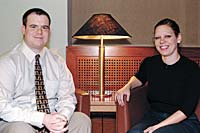 |
|
Hossfeld Scholars Geoffrey Zelley and Anne Champion.
Photo by: Claire Duggan
|
Generosity can last well beyond a lifetime. Just ask Anne Champion and Geoffrey Zelley, the first two recipients of GW Law’s coveted Raymond F. Hossfeld Scholarship. Established in 2002 as a living memorial to devoted two-time GW alumnus Raymond Hossfeld, BS ’30, LLB ’34, the three-year, full tuition and fees scholarship is awarded on the basis of merit and need to a top student in each entering class.
Champion, the first Hossfeld Scholar, is now in her second year at GW Law, while Zelley, the 2003 recipient of the award, began law school this fall. By the fall of 2004, there will be a Hossfeld Scholar in every GW Law School class in perpetuity.
Hossfeld’s legacy of support to his alma mater mirrors the strong emphasis that he placed on education throughout his life. Hossfeld attended GW Law at night, while working days as a patent examiner at the U.S. Patent Office. Upon graduating, he combined an undergraduate degree in electrical engineering with his law degree to carve out a successful career as a government patent attorney. Hossfeld worked for two decades as an attorney at the Navy Department, ultimately rising to chief civilian counsel for patents. In 1957, he returned to school, earning a master’s degree in nuclear engineering from Catholic University, and subsequently landed a position as patents counsel for the U.S. Naval Ordnance Laboratory.
As he and his late wife Anna, who predeceased him, had no children, Hossfeld designated in his will that, upon his death, his estate be used to establish a foundation exclusively for charitable, educational, literary, artistic, and scientific purposes, including the “giving of grants and scholarships on the basis of both academic merit and need.” Soon after he passed away in June 2000 at the age of 95, the Raymond F. Hossfeld Foundation was born, giving rise to the Hossfeld Scholarship program.
While Hossfeld’s close ties to GW certainly make the Law School a meaningful recipient of the scholarship, it was the University’s winning grant proposal that secured the deal. “We awarded the scholarship to GW Law School because they submitted the best proposal of all the law schools,” says Raymond F. Hossfeld Foundation Director William E. Davis. “GW also offered the best matching grant proposal and had the best mechanism in place to monitor the performance of the Hossfeld scholars, who receive the scholarship for all three years of law school if they maintain a B average and continue to exhibit financial need.”
It’s a decision that would have made Raymond Hossfeld proud, says Suzanne Richards, JD ’57, LLM ’59, the personal representative of his estate and a director of the Hossfeld Foundation. “His heart was in GW,” she says. “The fact that there will be a Hossfeld scholar each year at GW Law School is something that he would have been delighted to see in your magazine.”
According to Richards, Hossfeld felt strongly that students who merited the opportunity to go to law school, but lacked the financial wherewithal, should have the chance to receive the best legal education available through scholarships. “He would have been pleased to know that GW is carrying out his legacy by using his estate to underwrite the expense of deserving law students,” says Richards, who knew Hossfeld for 25 years.
Both Champion and Zelley bring a technical background with them to GW Law, just as Hossfeld did. Champion earned a bachelor’s degree in physics from the University of Iowa in 1996 and a master’s degree in comparative literature from the Graduate Center of CUNY University in New York in 2001 before deciding to pursue a law degree. “I’m very analytical and love to solve problems, and was looking for an engaging career where I could use both my analytical and language skills,” she says.
Zelley earned a bachelor’s degree in chemical engineering from the University of Virginia in 2001 and worked for a biotech company in Princeton for a year before returning to Virginia, where his wife attends medical school. In Princeton, he particularly enjoyed helping the in-house counsel of his company with patent law work. “That experience helped clarify for me what direction it was that I wanted to go in my career,” he says.
Both say that they are honored and grateful to be the recipients of the Hossfeld Scholarship. “It shows a great deal of confidence in my abilities, and has helped me realize more and more that I’ve made the right decision in coming to law school,” says Zelley.
Champion, who says that the scholarship brought her to Washington, is thrilled with her decision to come to GW Law. “It’s great to be here,” she says. “There are so many amazing opportunities for law students in D.C.—opportunities that cannot be matched anywhere else.”
The scholarship will continue to make a huge difference to them down the road in the form of dramatically lower debt burden. “I’m a public-service oriented person, and the scholarship really broadens my career choices,” she says. “A lot of law students come out of law school with so much debt that they feel that they have no choice but to get a high paying job.”
Zelley concurs. “The scholarship really gives me peace of mind,” he says, “as well as the freedom to get the most out of my time here at law school and find the perfect job for me, not the job that I need to pay off my debt.”
—Jamie L. Freedman
Standing on the Shoulders of Others
When GW Law School opened its doors for the 2003-04 academic year, students were greeted by a new student lounge in Stockton Hall, as well as a spacious amphitheatre classroom in Stuart Hall, both thanks to the generosity of West Virginia attorney James Humphreys, JD ’79.
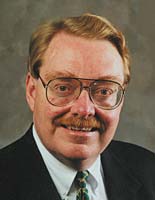 |
|
James Humphreys, JD ’79
|
For Humphreys, who established a GW Law School scholarship fund for deserving students several years ago, the decision was easy. “You have to put something back in the well,” he says. “You just can’t keep drawing out.”
The Charleston, W. Va., native launched his distinguished career while he was still in law school, working for consumer advocate Ralph Nader and serving as legislative assistant to U.S. Senator John Glenn and chief legislative counsel to U.S. Senator Donald Reigle. In 1979, he founded his Charleston-based law firm, James F. Humphreys & Associates, now one of the nation’s most prominent firms focusing on product liability, toxic torts, and wrongful death cases, with a special emphasis on asbestos and tobacco litigation. “Over the years, we have represented around 11,000 families of victims who were exposed to asbestos dust on the job,” he says.
Humphreys was elected to the West Virginia legislature in 1982, where he served for distinction for 12 years, twice being named legislator of the year. During his tenure, Humphreys chaired the Senate Judiciary Committee, as well as the Constitutional Revision Committee of the House of Delegates.
Throughout his accomplished career, he has never forgotten his roots. “My father was a garbage collector and my mother ran a small store,” says Humphreys. “Their values helped shape my social conscience. I was taught to respect working people and their struggle to create a decent life, and believe that the law can be a tool to improve the lives of working people.”
Humphreys, who says that he received a “first rate” legal education at GW, states that he is happy to give something back to his alma mater. “Sir Isaac Newton once said, ‘If I achieved greatness, it’s because I have stood on the shoulders of others,” quotes Humphreys. “I strongly believe that my success is due to the foundations laid by those who came before me, and, that, therefore, it’s my responsibility to help make the pathway easier for others coming down the road.”
He has just one piece of advice for current GW Law students. “I hope they spend as much time in the classroom as they do in the lounge,” he says.
—JLF
The Foundation for a Stronger Community
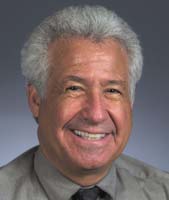 |
|
Professor Eric Sirulnik
|
Many gifts made to GW Law School help students gain practical experience, assist faculty members in continuing research, or help the greater community gain legal aid in times of need. When gifts are made to the Jacob Burns Community Legal Clinics, students, faculty, and the community are supported all at the same time.
To that end, David Webster, LLB ’64, through the David Z. and Janie H. Webster Family Charitable Foundation he founded with his wife, created an open endowment fund, the Eric Scott Sirulnik Community Legal Clinics Fund, to provide litigation support to the clinics. It is “foundational support,” he says, and he hopes fellow alumni and friends of GW Law School will help build on the gift. The endowment was made to honor Professor Eric Sirulnik’s devotion to clinical legal education, the community, and the legal clinics themselves. Sirulnik, who developed and directed the clinics since 1971, says he witnesses the positive impact of Webster’s generosity every day.
“The students benefit from the experience they gain while conducting research and assisting the attorneys. But it goes beyond that—some become so inspired by their work in the clinics that they set new goals and dedicate their careers to serving the public interest,” Sirulnik says.
The more than 2,000 people every year who seek representation and counsel from the clinics benefit as well, gaining support in areas including federal and appellate issues, custody cases, consumer mediation, health rights issues, immigration law matters, international human rights cases, and vaccine-related injuries. Sometimes, the clinics are the last place they turn—and the first place they find help.
“The most rewarding work anyone can do is to help someone who is fully prepared to be shuffled off; to look at that person and say, “We can help you.” Watching their reaction to those words is extraordinarily inspiring,” Sirulnik says.
Webster first became interested in GW’s legal clinics after reading John Grisham’s Street Lawyer, set in a D.C. homeless shelter. “GW had no Burns Community Legal Clinics when I was in law school,” he says. “I was, however, familiar with law school clinics, having been involved with them in Boston while doing non-profit work for the homeless there.”
Through reports students submit to the University, Webster gains insight into how the students, faculty, and community benefit from the law clinics.
“I like to get feedback from the students, I want to see what they are learning through their experiences and that they understand the value of the work that they do,” Webster says. “I often call students ‘stakeholders’ because it’s important to remember that we’re not giving just to build buildings, but to build citizens and lawyers. The students are the primary product of the University.”
Now living with his wife in New London, N.H., Webster retired as senior vice president with AON’s Boston office. AON is leading world-wide property-casualty/employee benefits broker and consultant. He says his GW Law education was very helpful with his concentration providing professional liability insurance for all classes of professionals, especially lawyers.
Taking in the beautiful New Hampshire scenery, Webster and his wife enjoy outdoor activities including biking, skiing, golf, and sailing—a passion he shares with Sirulnik.
The Webster Family Foundation is a private foundation which supports scholarships and internships at schools which the Websters attended. The grants are “open” and are usually given in the name of a respected faculty member. The Websters hope others will add to such grants in support of that faculty member’s accomplishments. Sirulnik says it is an honor to be recognized by someone whom he admires.
“I was very flattered and gratified, after speaking with and getting to know David Webster, that he thought our clinics were worthy of such a generous gift,” Sirulnik says. “The results have helped the University and the community in far-reaching ways that will have a lasting impact.”
—Laura Ewald
The Fateful Football Game
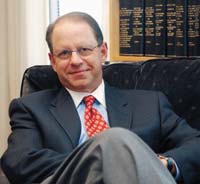 |
|
Steven Lerman, JD ’72
Photo by: Claire Duggan
|
“Serendipity” is the operative word to describe the life and career of Steven Lerman, JD ’72. Manager of D.C.-based communications law firm Leventhal Senter & Lerman and general counsel for communications giant Infinity Broadcasting Corp., Lerman says he gained his strong work ethic from his days at GW Law School. But the catalyst of this active alumnus’ law career was a fateful football game.
His family originally was in the shoe business in Boston—a path Lerman thought he might take after college. But plans changed during his senior year at the University of Pennsylvania, where he received a bachelor of science degree in economics. Lerman, then president of Tau Epsilon Phi, and his fraternity brothers attended the Ivy League Championship game between Harvard and Penn.
“The game was the same day as the business boards. I thought there would be another chance to take the exam, but there wasn’t,” Lerman says. “So I took the law boards instead and ended up in Washington. It was an involuntary epiphany.”
Penn might have lost the game, but Lerman gained the opportunity of a lifetime: Rather than pursue his interests in business, he instead took the law boards and applied to GW, which attracted Lerman with its reputation and location.
“I wanted to come to GW because it was intellectually appealing. I wanted to come to Washington, the locus of political power. It was an exciting place to be in the ’60s, with the Vietnam War going on and the unfortunate events at Kent State, which occurred during my first year at GW,” Lerman says.
Despite the turmoil of the times, Lerman found a new sense of purpose and a new ability to focus at GW.
“At GW, I needed to learn discipline to succeed. It was highly competitive—free of distractions,” Lerman says. “I learned the discipline of hunkering down and focusing to learn and succeed.”
When navigating his career path out of law school, Lerman says he followed the advice he now gives to the GW Law students who visit his firm (where several other GW Law grads work) and the Penn and GW students whom he supports through fundraising and merit scholarships.
“When I speak to young people, I often remind them that serendipity has a lot to do with the course of your life,” Lerman says. “When I became a lawyer, I wanted to return to Boston, but the right jobs weren’t there. So I stayed in D.C.”
He began working with a communications firm, where he stayed for 15 years before helping to build Leventhal Senter & Lerman with his partners in 1986. As managing partner, Lerman handles personnel, human resources, and other in-house matters. He also serves as general counsel for Infinity Broadcasting, the radio subsidiary of Viacom. He counsels on the acquisition and sale of radio and television properties; handles equal employment opportunity matters; represents broadcast stations in all areas of FCC regulation; and negotiates on-air talent agreements for Infinity, including the company’s employees, such as notorious DJs Howard Stern and Don and Mike.
They are two vastly different roles, and Lerman says balance and growth have helped him meet the needs of his firm and his clients.
“These jobs require different sets of skills. I’ve learned to roll with the punches,” Lerman says.
With his wife of nearly 25 years, Charla, and their four children, Lerman reaps the rewards of his hard work. He enjoys his career and time with his family and takes pride in giving back to his schools. To honor his former TEP houseman and a fraternity brother, he spearheaded the establishment of financial aid scholarships in their names. He created a merit scholarship at GW, the school that gave him a legal edge and honed his determination to succeed. The scholarship supports an academically accomplished entering GW Law student for his or her entire three years at the Law School, with preference given to those applicants who received their undergraduate education at Penn and also are in need of financial assistance.
“I am happy to contribute to GW,” Lerman says. “I’m grateful to GW. The University was very demanding and taught me how to focus. I got a great education that allowed me to compete in the legal community with anyone. The Law School was very challenging, and its high standards have escalated even further since my graduation in 1972.”
Lerman says connecting with students also is highly rewarding way of keeping in touch with GW and the ever-burgeoning law community.
“I enjoy meeting students and young lawyers,” Lerman says. “It helps me stay involved and keeps me connected.”
—LE
The Dean’s Fund: Your Gift Makes a Difference
 As you know, GW Law’s strength is in its numbers. The median LSAT for entering students has, for the fourth year in a row, increased a full point, in addition to a rise in the median GPA; our faculty has again published a record number of articles, books, and scholarly papers; we have increased the school’s physical space by more than 60 percent since 2001; have sponsored five GW moot court teams to national finalist competitions; added two new international programs, and we boast top ranked programs in intellectual property, government contracts, environmental law, international law, and the community legal clinics.
As you know, GW Law’s strength is in its numbers. The median LSAT for entering students has, for the fourth year in a row, increased a full point, in addition to a rise in the median GPA; our faculty has again published a record number of articles, books, and scholarly papers; we have increased the school’s physical space by more than 60 percent since 2001; have sponsored five GW moot court teams to national finalist competitions; added two new international programs, and we boast top ranked programs in intellectual property, government contracts, environmental law, international law, and the community legal clinics.
Yet another strength for GW Law is the back-to-back years of increased giving. Almost every aspect of our daily life has been touched by the generosity of our donors. The impact is remarkable. Alumni, friends, parents, the faculty, staff, and students each contributed greatly and we are deeply grateful, as will be countless future generations of GW Law students.
In order for us to continue providing these kinds of opportunities to our students, we need your annual contribution to the Dean’s Fund. Your support truly is a mark of distinction for GW.